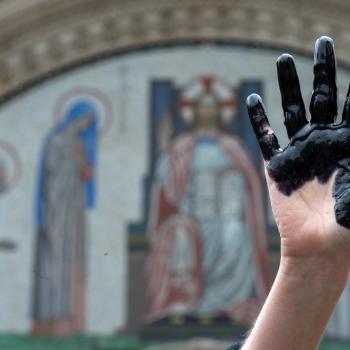
Calumny is a grave sin. Everyone deserves to be treated with charity. No one should have their reputation unjustly destroyed. Everyone has their foibles, their particular character defects, and it would be easy for us to use them to destroy someone’s reputation. All that we need to do in order to hurt someone else’s good name is to exaggerate their character flaws, making those blemishes appear prominent while ignoring all their good qualities, for this will easily make them appear vile. Calumny doesn’t have to be used against only a particular person, it can be used to denigrate groups of people with unjust generalizations. In all instances, calumny is used to disregard the dignity of others. Many forms of systematic sin derive power and are fueled by the sin of calumny. Racism, sexism, and religious discrimination all use calumny as a part of their justification. Groups of people, whether or not the group is based upon voluntary association (as some religions are), find themselves unjustly treated as a result of generalizations made against them, and the more those generalizations are promoted and supported, the worse their place in society tends to be.
So long as we feel free to gossip and destroy the reputation of others, we are like ravaging wolves, treating people as fodder. Certainly, there are many reasons why we might engage in calumny. Sometimes, it is out of anger, when we feel someone has hurt us and we want to hurt them back. Sometimes, it might be out of envy; in such a case, we want what our victim has and we think if we destroy their good name, they will lose it, so we will no longer be envious of them, or worse, we think we can use detraction as a way to take what they have from them so we can have it for ourselves. Or, we might be afraid of someone, thinking that if we do not give them a target to attack, they will attack us instead, and so we use calumny to create such a target. While these, and other reasons, might explain why we do what we do, once we get caught up in the act of calumny, we often lose control of ourselves as we find ourselves engaging worse and worse forms of calumny in order to preserve our ruse. We let our tongues (or our fingers) take control, letting lose tirade after tirade, telling those who are wise more about ourselves than those whom we desire to undermine. Obviously, this is not to say we should ignore evils in the world, and if someone poses a grave threat to the common good because of what they have done, the public should be warned so that they can properly defend themselves. But this is easily used as an excuse. We must remember that when the common good (or someone’s private good) is not unjustly threatened, we should not engage gossip which can lead to harming someone’s reputation.
Abba Hyperechius warned against calumny. He pointed out to his fellow monks that it would be better for them to forgo their ascetic labors than it would be to commit slander “It is better to eat meat and drink wine and not to eat the flesh of one’s brethren through slander.”[1] Hyperechius understood that the good intended by fasting is lost if one disengages from charity, for fasting is supposed to help us learn how to gain control of ourselves and not fall for some inordinate passion. Fasting is a tool, not an end in and of itself. Fasting is not proper if it is not engaged in the spirit of charity. If we fast, but do not grow in virtue, all we do is make ourselves needlessly hungry.
Nonetheless, it is not just those who speak, but those who listen to calumny who find themselves in danger. For, those who listen to gossip, even if they do not spread it, can believe it and use it to unjustly treat others:
He also said, ‘It was through whispering that the serpent drove Eve out of Paradise, so he who speaks against his neighbour will be like the serpent, for he corrupts the soul of him who listens to him and he does not save his own soul.’ [2]
Thus, those who slander others not only ruin the reputation of those they unjustly attack, not only do they hurt themselves by their own sin, they also hurt and destroy those who would listen to what they have to say. Calumny shows us the way many sins can be and are communal in nature, affecting and destroying groups of people at one time. Likewise, we can see how sin forms systematic structures which influences the actions of people, for calumny establishes a mentality and belief which is then acted upon by those who believe the lies. And when systematic structures of sin are already set up and control a given society, calumny helps reinforce those structures, using lies to keep them in place. We can see this, for example, in racism, sexism, or religious discrimination, as calumny is used to justify unjust impositions on people, making them less equal than the rest of society.
While we must never justify evil, we must also be careful in how we deal with it. We must deal with others in justice and with great mercy. Justice without mercy is not justice. The good which people do should be recognized. People deserve to have their good name preserved. Everyone has flaws. We should not be focus on them, nor unjustly treat one person, or one group of people, according to flaws which we see, while ignoring the flaws of everyone else, so as to make the person or group appear worse than they really are, which is, worse than everyone else. When we promote the good, we get more good. When we focus on the evil, we tend to return evil with evil. We must look to the good, promote the good, and in doing so, hope we will be able to take that good and use it to form something better, for that is what we should be doing, hoping to make things better instead of keeping things as they are. Calumny, because it does not seek what is good, should have no place in our activity, for once it is accepted, it will only makes things worse.
[1] The Sayings of the Desert Fathers. trans. Benedicta Ward (Kalamazoo, MI: Cistercian Publications, 1984), 238 [Saying of Abba Hyperechius #4].
[2] The Sayings of the Desert Fathers, 238 [Saying of Abba Hyperechius #5].
Stay in touch! Like A Little Bit of Nothing on Facebook.
If you liked what you read, please consider sharing it with your friends and family!













